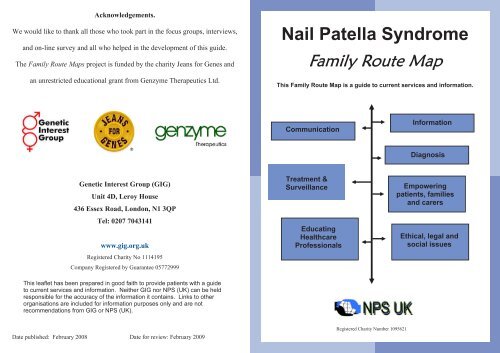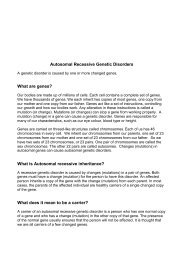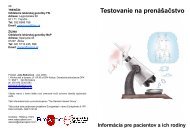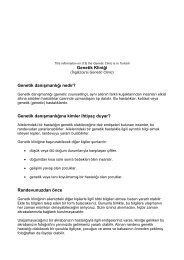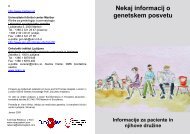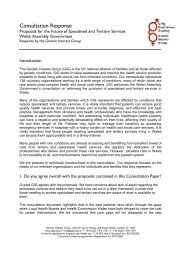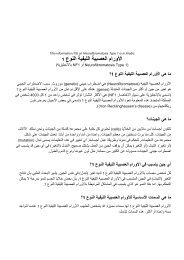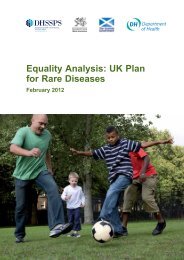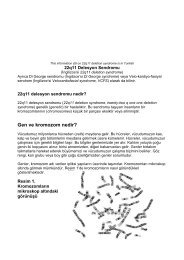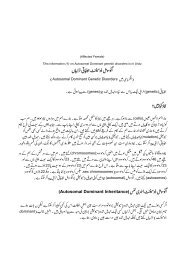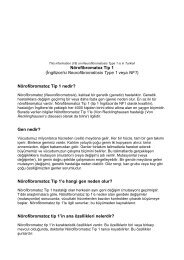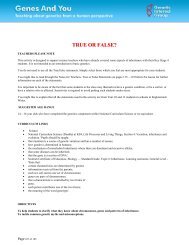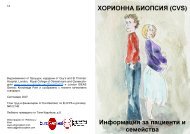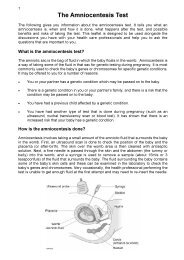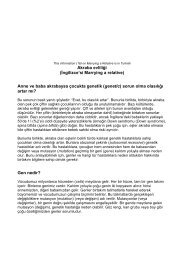Nail Patella Syndrome - Genetic Alliance UK
Nail Patella Syndrome - Genetic Alliance UK
Nail Patella Syndrome - Genetic Alliance UK
Create successful ePaper yourself
Turn your PDF publications into a flip-book with our unique Google optimized e-Paper software.
Acknowledgements.<br />
We would like to thank all those who took part in the focus groups, interviews,<br />
and on-line survey and all who helped in the development of this guide.<br />
The Family Route Maps project is funded by the charity Jeans for Genes and<br />
an unrestricted educational grant from Genzyme Therapeutics Ltd.<br />
<strong>Nail</strong> <strong>Patella</strong> <strong>Syndrome</strong><br />
Family Route Map<br />
This Family Route Map is a guide to current services and information.<br />
Communication<br />
Information<br />
Diagnosis<br />
<strong>Genetic</strong> Interest Group (GIG)<br />
Unit 4D, Leroy House<br />
436 Essex Road, London, N1 3QP<br />
Tel: 0207 7043141<br />
www.gig.org.uk<br />
Registered Charity No 1114195<br />
Company Registered by Guarantee 05772999<br />
Treatment &<br />
Surveillance<br />
Educating<br />
Healthcare<br />
Professionals<br />
Empowering<br />
patients, families<br />
and carers<br />
Ethical, legal and<br />
social issues<br />
This leaflet has been prepared in good faith to provide patients with a guide<br />
to current services and information. Neither GIG nor NPS (<strong>UK</strong>) can be held<br />
responsible for the accuracy of the information it contains. Links to other<br />
organisations are included for information purposes only and are not<br />
recommendations from GIG or NPS (<strong>UK</strong>).<br />
Date published: February 2008 Date for review: February 2009<br />
Registered Charity Number 1095621
INTRODUCTION<br />
This leaflet is designed to provide signposts to sources of current<br />
information and appropriate services for patients, their families and<br />
carers, together with healthcare professionals. The issues and<br />
concerns raised during a series of patient focus groups in 2006<br />
organised by the <strong>Genetic</strong> Interest Group (GIG) identified seven<br />
themes (see front cover) which have been used as the basis for<br />
developing this resource with the help of patients, families and<br />
carers, and clinical staff with experience and expertise of this<br />
condition.<br />
<strong>Nail</strong> <strong>Patella</strong> <strong>Syndrome</strong><br />
<strong>Nail</strong> <strong>Patella</strong> <strong>Syndrome</strong> (also called Fong’s Disease, Hereditary<br />
Onychoosteodysplasia [“HOOD”] or Turner-Kieser <strong>Syndrome</strong>) is<br />
characterised by several typical abnormalities of the arms and legs<br />
as well as kidney disease and glaucoma. It is a complex condition<br />
that varies greatly between each individual.<br />
<strong>Nail</strong> <strong>Patella</strong> <strong>Syndrome</strong> <strong>UK</strong> is a registered charity working to<br />
promote awareness of the condition. The charity was officially<br />
registered in January 2003 and the main aims and objectives are<br />
to increase awareness and raise funds to allow the valuable<br />
research work to continue. Another very important aspect of their<br />
work is to host medical conferences every two years, bringing<br />
together healthcare professionals with expertise in <strong>Nail</strong> <strong>Patella</strong><br />
<strong>Syndrome</strong> (NPS) and individuals and families living with the<br />
condition, providing a platform for sharing experiences and<br />
information. The charity has a website www.npsuk.org<br />
You can contact the charity either by phoning 0800 121 8298 or<br />
by email to npsuk_info@yahoo.co.uk or by writing to:<br />
PO Box 26415, East Kilbride, Glasgow, G74 1YW.<br />
TIP<br />
<strong>UK</strong> schools have a Special Educational Needs Coordinator<br />
(SENCO) whose role is to ensure every effort is made to tailor<br />
the individual needs, physical, emotional or educational, of a<br />
child within that school. You can ask to speak to the SENCO at<br />
your child’s school any time.<br />
Links<br />
Other useful organisations:<br />
Birth Defects Foundation www.bdfnewlife.co.uk Tel: 08700 707020<br />
British Society for Human <strong>Genetic</strong>s (BSHG): www.bshg.org.uk<br />
Carers <strong>UK</strong> www.carersuk.org Tel: 0808 808 7777<br />
Citizens Advice Bureau www.citizensadvice.org.uk<br />
Contact-A-Family: www.cafamily.org.uk Tel: 020 7608 8700<br />
Directgov www.direct.gov.uk provide a website with help on benefits and<br />
entitlements<br />
Disability Benefits Office Tel: 08457 123456<br />
Disablement Income Group Scotland www.digscotland.org.uk<br />
Tel: 0131 555 2811<br />
GIG (<strong>Genetic</strong> Interest Group) have a range of patient leaflets on their website<br />
www.gig.org.uk/eurogentest_patientleaflets.htm Tel: 020 7704 3141<br />
International Glaucoma Association www.glaucoma-association.com<br />
Tel: 01233 648170<br />
<strong>Nail</strong> <strong>Patella</strong> <strong>Syndrome</strong> Worldwide www.nailpatella.org<br />
Parents Centre www.parentscentre.gov.uk a website with resources and<br />
links to specialist help with education, money matters and more<br />
The Family Fund www.familyfund.org.uk Tel: 0845 1304542<br />
2<br />
TIP<br />
MedicAlert Foundation: www.medicalert.org.uk<br />
MedicAlert ID emblems enable emergency medical staff to call a<br />
24-hour helpline number to obtain detailed information on your<br />
medical condition, a summary of which is engraved on the<br />
emblem.<br />
The <strong>UK</strong>GTN (<strong>UK</strong> <strong>Genetic</strong> Testing Network) has produced a patient leaflet<br />
www.ukgtn.nhs.uk/gtn/<strong>UK</strong>GTN-information/Patient-leaflet.html<br />
Youre ABLE, Information, products and services for disabled people<br />
www.youreable.com has a website with Forums and Discussion<br />
Wellchild www.wellchild.org.uk Tel: 0808 801 0330<br />
7
6<br />
OTHER INFORMATION<br />
Insurance<br />
It is common to have difficulties finding adequate and affordable<br />
insurance policies once diagnosed with a genetic condition. The<br />
following companies offer travel insurance for people with preexisting<br />
conditions. There may be others available and this list<br />
should not be taken as a recommendation:<br />
• The insurance group Banner - see www.bannergroup.com<br />
have a simple policy that anyone declared fit for travel by<br />
Interhealth, see www.interhealth.org.uk is covered as normal<br />
by them. They don't have extra rates for particular conditions.<br />
• Free Spirit (AXA Insurance <strong>UK</strong> plc) www.free-spirit.com<br />
for people with medical conditions and/or disabilities<br />
Tel: 0845 2305000, email: sales@pjhayman.com<br />
• AllClearPlus (Groupama Insurance Co Ltd)<br />
www.allcleartravel.co.uk provides a special policy.<br />
Tel: 08712 088500, email: info@bishopscourtas.co.uk<br />
• Freedom Insurance www.freedominsure.co.uk offer travel<br />
insurance. Tel: 01223 454290<br />
Financial help<br />
CAB (Citizens Advice Bureau) can help with advice locally about<br />
benefits and can be found through your phone directory.<br />
Psychological help<br />
Psychological counselling is not commonly offered on diagnosis or<br />
even later on. If you feel that you need extra help in coming to<br />
terms with your condition or any other aspect of your life, don’t be<br />
afraid to ask for this via your GP.<br />
Education<br />
If you have concerns about Attention Deficit Disorder (with or without<br />
hyperactivity) possibly affecting your child or if they are<br />
experiencing other problems at school discuss this with your<br />
Community Paediatrician or ask for a referral to specialist services<br />
from your GP or Health Visitor.<br />
Exercise<br />
Care should be taken to ensure exercises are suitable for an<br />
individual with NPS, always check with your lead healthcare<br />
professional. The NPS Worldwide website has a list of suggested<br />
exercises www.nailpatella.org/workout.html<br />
INFORMATION<br />
<strong>Nail</strong> <strong>Patella</strong> <strong>Syndrome</strong> (NPS) is a genetic condition which affects<br />
the nails, knees, elbows and can cause iliac horns (bony<br />
protrusions on the pelvis bones). There are, however, many other<br />
features that may be seen in this condition and other body<br />
systems such as the kidneys and eyes may be affected. In the<br />
skeletal system, tendons, ligaments and muscles can be affected<br />
as well as bones. The severity of the features of NPS and how<br />
often each feature occurs, varies between one person with NPS<br />
and another, even within the same family. A person with NPS does<br />
not have to have all of the features of the condition.<br />
NPS is inherited in an autosomal dominant manner, that is, the risk<br />
of transmission is 50% per pregnancy (just like flipping a coin).<br />
Approximately 20% of cases are sporadic, being the result of a<br />
new mutation (gene change).<br />
The condition is found in approximately 1 in 50,000 of the<br />
population and occurs in all ethnic groups.<br />
The <strong>Genetic</strong> Interest Group (GIG) website has a series of leaflets<br />
explaining more about inherited conditions and includes;<br />
• ’Dominant Inheritance’,<br />
• glossary of terms used in genetics, and<br />
• useful questions to ask when going for an appointment.<br />
Please see www.gig.org.uk/eurogentest_patientleaflets.htm<br />
<strong>Genetic</strong> Testing:<br />
<strong>Genetic</strong> testing and counselling is available at 23 regional NHS<br />
genetic centres throughout the <strong>UK</strong>; please see the website of<br />
www.bshg.org.uk for a list and also in their section ‘For Patients’<br />
there is an explanation of what <strong>Genetic</strong> Counselling is and is not.<br />
A referral to a genetic centre is usually made through your GP or<br />
specialist. Importantly, if you were seen several years ago in a<br />
Clinical <strong>Genetic</strong>s Unit you may wish to be reviewed and in this<br />
case it might be possible to contact them directly yourself.<br />
There are a number of issues surrounding genetic testing<br />
particularly in relation to children and as such, many patients may<br />
wish to be seen and counselled by a consultant clinical geneticist<br />
as early on as possible. 3
DIAGNOSIS, TREATMENT AND SURVEILLANCE<br />
INFORMATION FOR HEALTHCARE PROFESSIONALS<br />
It is very common for families to remain undiagnosed for several<br />
generations despite having been seen by doctors from a variety of<br />
disciplines. However, screening is recommended for all patients<br />
diagnosed with NPS.<br />
Information and articles about NPS are available from the NPS<br />
(<strong>UK</strong>) website www.npsuk.org/medical_info.html<br />
or at the following websites;<br />
Recommendations for the care of patients with NPS have been<br />
published by Sweeney et al in 2003 in the Journal of Medical<br />
<strong>Genetic</strong>s. This includes:<br />
• Annual screening for renal disease from birth.<br />
• Screening for glaucoma in adulthood every 2 years.<br />
• Before treatment such as surgery or intense physiotherapy is<br />
considered Magnetic Resonance Imaging (MRI) should be<br />
undertaken to determine abnormal anatomy.<br />
• <strong>Genetic</strong> Counselling should be offered to all patients.<br />
TIP<br />
<strong>Genetic</strong> Counsellors (part of the NHS Clinical <strong>Genetic</strong>s Services)<br />
can help with concerns around the impact on you and your<br />
family of being diagnosed with a genetic condition and may be<br />
able to give you information about where to go for support.<br />
GeneReviews www.genetests.org (One of the authors is<br />
Dr Elizabeth Sweeney, Clinical <strong>Genetic</strong>ist , <strong>UK</strong>. )<br />
OMIM — Online Mendelian Inheritance in Man<br />
www.ncbi.nlm.nih.gov/entrez/dispomim.cgi?id=161200<br />
Orphanet (European database) www.orpha.net<br />
Free-access website providing information on rare diseases<br />
The National Organization for Rare Diseases<br />
www.rarediseases.org<br />
The Renal Unit of the Royal Infirmary of Edinburgh<br />
www.edren.org provides further information about the possible<br />
renal complications<br />
Information about Education for Healthcare Professionals:<br />
In pregnancy there is an increased frequency of preeclampsia<br />
(high blood pressure, swelling and proteinuria). Antenatal care<br />
should include surveillance by the adult nephrology (kidney<br />
specialist) team.<br />
Contact <strong>Nail</strong> <strong>Patella</strong> <strong>Syndrome</strong> (<strong>UK</strong>) for further information on<br />
centres of expertise or clinicians who have experience of<br />
diagnosing and managing the condition: Tel: 0800 121 82 98.<br />
The NHS National <strong>Genetic</strong>s Education and Development Centre<br />
www.geneticseducation.nhs.uk<br />
provide information and resources for healthcare professionals.<br />
British Society for Human <strong>Genetic</strong>s www.bshg.org.uk<br />
<strong>Genetic</strong>s in Family Medicine: The Australian Handbook for<br />
General Practitioners www.gpgenetics.edu.au<br />
4<br />
In the <strong>UK</strong>, patients have the right to ask for a second opinion via<br />
their first specialist or through their GP. They are not, however,<br />
entitled to receive that second opinion if the clinicians do not think<br />
it necessary. A patient may appeal against any decision via their<br />
Primary Care Trust (PCT). For more information on the Referral<br />
Process please see: www.gig.org.uk/docs/referrals.pdf<br />
TIP<br />
Say how you feel: if you don’t want your picture taken; or if<br />
you don’t want medical students participating in your<br />
appointments; or clinical staff discussing your child in front of<br />
them, don’t be afraid to say so.<br />
5


